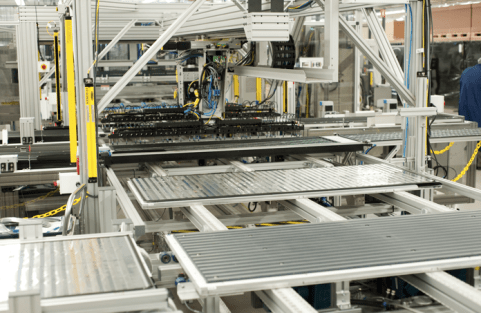
It’s not an empty claim either. The company has reported that its thin film converts 13.8 percent of the sunlight it absorbs into usable energy, a world record — and that fact has been verified by the National Renewable Energy Laboratory, an independent third party.
[aditude-amp id="flyingcarpet" targeting='{"env":"staging","page_type":"article","post_id":189990,"post_type":"story","post_chan":"none","tags":null,"ai":false,"category":"none","all_categories":"business,enterprise,","session":"D"}']This efficiency rate has been achieved and exceeded by several companies in laboratory settings, but not in commercial production. MiaSole says that it will be ready to ship its modules, measuring about 1 square meter with efficiencies exceeding 13 percent, by next year. The only thing holding the company back is the proper certification.
MiaSole’s achievement are even more impressive considering the composition of its thin film. Most of its competitors are still relying on polysilicon, and while the costs for this material are coming down, they still remain relatively high. MiaSole makes its modules out of copper indium gallium selenide (known widely as CIGS), which makes them much cheaper (50 cents per watt) than most of the other, similar products on the market.
AI Weekly
The must-read newsletter for AI and Big Data industry written by Khari Johnson, Kyle Wiggers, and Seth Colaner.
Included with VentureBeat Insider and VentureBeat VIP memberships.
CIGS has mostly been dismissed by the solar industry, because the companies working on it have had very little to show for themselves. If MiaSole positions this efficiency milestone successfully, it could validate the technology at large, not just its designs.
Given this momentum, the company plans to ramp up its production. In the first half of 2010, it shipped about 6.5 megawatts worth of solar modules. By the end of the year, it plans to bump this figure up to 22 megawatts. It’s targeting utilities and independent energy vendors with its products — but has actually already brought Chevron on as a client). MiaSole says its panels are ideal for both rooftop and ground mount solar arrays.
The company has been the quietest contender in the thin-film race for too long, it seems. But maybe that will give it an edge as it cranks up manufacturing to churn out hundreds of megawatts worth of panels by the end of 2011. To accomplish this, it has a new manufacturing plant in the hopper, to be located in the southeastern U.S., according to Earth2Tech.
MiaSole also seems to be taking aim at Solyndra, the unofficial player to watch in the solar space (distinguished by the $535 million loan guarantee it received from the U.S. Department of Energy). The company says it will be able to make its modules for much cheaper than Solyndra will, making it a superior choice for commercial deployments.
Even though it’s been flying lightly below the radar, MiaSole has raised a great deal of capital already, exceeding $300 million. It also has some prestigious backers, including Kleiner Perkins Caufield & Byers and VantagePoint Venture Partners. These two are joined by Firelake Capital Management, Garage Technology ventures, and Nippon Koatsu Electric.
VentureBeat's mission is to be a digital town square for technical decision-makers to gain knowledge about transformative enterprise technology and transact. Learn More
